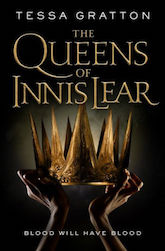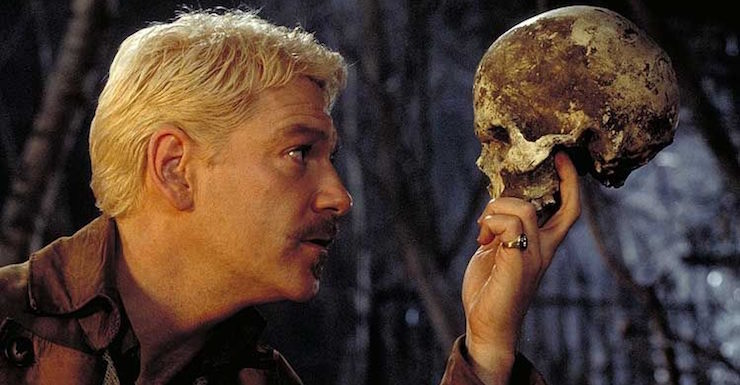I don’t remember which of Shakespeare’s plays I read first, but I do remember the first performance I watched, start to finish: it was Kenneth Branagh’s Henry V, playing on the TV when I was eleven and my dad was deployed in Desert Storm. I didn’t understand everything that was going on, and couldn’t have if I’d only read it. But because performance can energize and interpret the play for me, in specific ways, I was able to understand this play was about war, and it was about why men fight in wars. The monologue that made an unforgettable impression on small Tessa wasn’t from the Crispin’s Day speech. It was one spoken by a soldier with whom the king is conversing about the just nature of his war. Given the quagmire of wars American has been involved in since 2001, I could analyze this now with rather depressing politics, but as a child all I heard was why are we fighting this war? If my dad dies, what will it be for? The performance drew out the meaning of the speech even for my unprepared ears. I hadn’t thought to ask why before, and the performance taught that question.
I wish everyone were introduced to the Bard via great performance instead of being forced to read it, without the context of audience and energy, and usually by untrained voices. Because a capable performance changes everything.
“Tomorrow, and tomorrow, and tomorrow,
Creeps in this petty pace from day to day,
To the last syllable of recorded time;
And all our yesterdays have lighted fools
The way to dusty death. Out, out, brief candle!
Life’s but a walking shadow, a poor player,
That struts and frets his hour upon the stage,
And then is heard no more. It is a tale
Told by an idiot, full of sound and fury,
Signifying nothing.”
In print this soliloquy from Macbeth is a lovely poem that’s an extended metaphor about life and death and time. It can be analyzed like any literature: the words alone are so open to interpretation. But when performed with a bit of a sneer and some sarcasm, suddenly it’s a scathing indictment of common values. If delivered slowly, with woe and tears, it’s mournful and sweet… or possibly even horrifying and full of existential dread! In the play, Macbeth says these words right after hearing his beloved wife, who drove his ambition to greater heights, is dead. How does that change our understanding of the poem? How does a sneering delivery change our understanding of Macbeth and how he feels about the situation? Or if he is tearful, crying, what does that say?
Production matters so much: the director, actors, set, the audience participation via thrust stage or breaking the 4th wall, the awareness of context and choices. This is why we’ve been interpreting and reinterpreting Shakespeare’s plays for 400 years. He gives us a common language with which to interrogate ourselves in our own context.
Until recently, I thought Romeo and Juliet had nothing to offer me but beautiful poetry. Though I enjoy Baz Lurhman’s Romeo + Juliet for its cast and modern vision, it didn’t teach me anything new about the play, or about myself and my own context. Harold Perrineau’s amazing Mercutio aside, it’s still just a story about kids who fall in love while everybody around them makes terrible choices. Every production I’ve seen has moments of brilliance or beauty, but they all leave me cold because the central conflict has no bearing on my life.
Then I saw Private Romeo, a 2011 film that sets the play (rather messily and haphazardly) in an all-boys military academy. It creates a new context for the famous lovers—gay soldiers during the era of “don’t ask, don’t tell”—and it blew my mind (and my heart) because it took all that beautiful poetry and intense emotion, the mistakes and conflict, and made it relevant to my context. Here is my favorite scene from the movie, the “palm to palm” meeting. When two young men attending a military academy, in 2011 America, flirt and kiss over words such as “sin from my lips” and “give me my sin again” the entire meaning of the play shifts!
The reinterpretation doesn’t have to be complete to be affecting. I’ve seen many Hamlets, and pieces of each performance changed me (yes, even Mel Gibson, whose dark, manic leaping-about upon tables and watery eyes first gave me a way to understand that the Danish Prince was as confused about his life as I was). In college I rented Branagh’s epic Hamlet and watched it one Friday afternoon when my roommate was out of town. The next day, I watched it two more times, because I finally, finally understood the grandiose nature of the play, the questions it was asking, and Kate Winslet’s Ophelia was layered and complicated, especially regarding her relationship with Hamlet. Most importantly, in the scene where Hamlet returns to Denmark to find that they’re burying Ophelia, Kenneth Branagh delivers a simple line so clearly and with so much pain it changed everything I understood about the character.
“I loved Ophelia!”
That’s the line, nothing more, and yet the way he delivers it made me love him and I never had loved Hamlet before. This performance helped me invest in the person, not just the story and elaborate language. Caring about the character helped my own understanding of what it means to love a person obsessed with death.
And then came David Tennant in the RSC’s version, reinvigorating the play with humor. This Hamlet, directed by Gregory Doran, reminds us that Shakespeare was primarily an entertainer. More importantly: a funny Hamlet is an irreverent Hamlet. It interrogates the seriousness of the questions he asks, and undercuts the righteous, literary idea that Hamlet is The Most Important Work of Literature. If Hamlet can joke like this, then maybe humor isn’t just for the peanut gallery. Maybe humor, and coping with terror and trauma with humor, is closer to literature and closer to God than the history of Western canon likes to pretend.
For fun, look at these To Be or Not To Be speeches from the three versions I’ve mentioned and look at how audience and direction change everything. In Gibson’s, there is no audience but the viewer, no Claudius and Polonius judging Hamlet’s state of madness. He gives the speech in a tomb, quite literally the house of death. It’s a little obvious for my taste, but it clarifies the meaning of the speech: it is about Hamlet’s suicidal ideation and fear, not about performance of madness. Gibson’s Hamlet is not confused, only indecisive. Branagh, on the other hand, explicitly places his audience with Claudius and Polonius behind the mirror, and allows them to react. The use of mirrors complicates the speech with layers of reflections. We don’t know who is the “real” Hamlet. Does Hamlet know he’s being watched? All signs point to yes. This is performing, but to what extent? Is he acting mad, or slipping down the path? Tennant’s is all intimacy (and my favorite of the three). He does not know he’s being watched, and if he’s performing for anybody, it’s us, the viewing audience. But this speech is for himself. An honest, and rare in this version, window into Hamlet’s truth.
When I think of reinterpreting Shakespeare, it fills me with excitement, dread, and longing. I’ve loved the plays and the poetry since I was child. Like fairy tales, the plays are full of magic, monsters, and strong, complicated, morally ambiguous characters (ladies!). I’m always looking for the way I want to perform my context through the play—the words—when I am the set designer, the director, the actors, and I know my audience will only be reading. My words have to be everything. Tone, humor, and energy, the chemistry between audience and actor—it’s all on me.
The way I’ve worked with my retellings is to find the threads of emotion I can relate to through the plays, to watch and read other people’s interpretations and find the meaning that matters most to me, in this exact cultural moment. I can’t approach King Lear or Prince Hal without my personal, complicated baggage, and that’s the thing: how boring would it be if these plays were divorced from a context?
I’m still learning and discovering. I’ve said before (and will say again and again) that I’ve hated the king in King Lear since I was 17. No performance has ever made me feel even the slightest moment of sympathy for him. It’s been a huge problem in finding my way into the story of his daughters. But recently, between selling The Queens of Innis Lear and working on revisions with my editor Miriam Weinberg, I watched the RSC version starring Ian McKellan (free on PBS.org!) and within moments I felt myself swept away as I’d never been before, even by the likes of Lawrence Olivier. Here was a king, and a cast, and a director (the amazing Trevor Nunn), who had the nerve to make me care about Lear himself. Shakespeare’s words alone were not enough, and haven’t been for eighteen years. But the right actor saying one particular line, making one gesture I’d never seen before, and voila! I was hooked through my heart. That is why the plays have survived 400 years: new performances, new chemistry, new contexts for these devastating, complicated poems.
I’m going to leave you with a performance that’s haunted me since I saw it. It’s Claudius’s prayer for forgiveness monologue in Hamlet, which is usually a check-the-time, take a bathroom break sort of monologue for me. But in the Doran RSC version it is delivered with a chilling, breathtaking villainy by Patrick Stewart. He creates in Claudius a terrible sort of charisma that makes me finally, finally understand what Gertrude desires, and even hints at what, perhaps, the dead King Hamlet might have been like if he was anything resembling his brother.
Top image from Branagh’s Hamlet (1996).
This article was originally published in May 2016.
Tessa Gratton opens in a new window has wanted to be a wizard since she was seven. She’s lived on three continents and traveled across more, has a degree in feminism, and once translated her own Beowulf before settling down in Kansas to write and box and create the perfect whiskey cocktail. She’s the author of multiple YA and adult fantasy novels, plus more than a dozen short stories. She is currently a writer for season 2 of Serial Box Publishing’s series Tremontaine. Her novel The Queens of Innis Lear is available March 27th from Tor Books. Find her on Twitter @tessagratton.
has wanted to be a wizard since she was seven. She’s lived on three continents and traveled across more, has a degree in feminism, and once translated her own Beowulf before settling down in Kansas to write and box and create the perfect whiskey cocktail. She’s the author of multiple YA and adult fantasy novels, plus more than a dozen short stories. She is currently a writer for season 2 of Serial Box Publishing’s series Tremontaine. Her novel The Queens of Innis Lear is available March 27th from Tor Books. Find her on Twitter @tessagratton.










